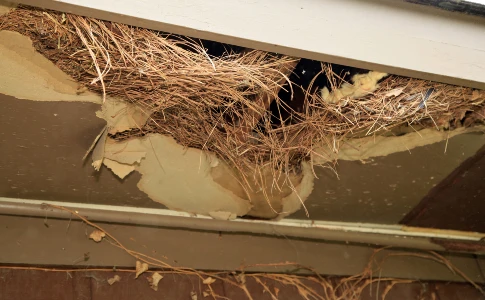
Squirrels are extremely active and cause a large amount of damage during the fall, winter, and spring. Squirrels use their strong razor like teeth to chew through almost all materials your home consist of in order to gain access into your walls, ceiling, and attic. Once in your home the damages that these little guys can create are astronomical. Squirrels are one of the hardest rodents to rid from a home because of how territorial and persistent they can be. Critter Stop offers an in-dept three step process to permanently rid rodents from your home.

When we have provided our squirrel removal services, we have found that they are amongst the few tidier rodents. Burrowing and creating latrines they cover with attic insulation to help mask their scent from predators. This can make it difficult to locate droppings they may leave behind. However, there are still several ways to determine a squirrel has taken residency in your home. The most common are the noises you will hear. Squirrels, unlike other rodents are diurnal. Which means you will commonly hear scratching, scurrying, and chewing noises in the early morning and late evening.
Based on our experience dealing with squirrels, another way of determining if rodents have taken residency in your home’s walls, ceiling, or attic is to inspect your eaves and fascia boards on the exterior of your home. Eaves are the part of the roof that hangs out over the walls to provide shade to the exterior of your home. Since these are only wood boards, squirrels can easily chew through it, given the squirrel has somewhere for their teeth to catch.

This chewing typically takes place in what we call a roof return (where the soffit board returns to the roof of your home). About 90% of roof returns have a natural gap from where the board was cut an inch or two to short. Critter Stops first step to evicting the squirrels will be to permanently seal these holes with a painted to match, galvanized sheet metal. Although squirrels have been known to chew directly through metal, this metal will be far too thick for the squirrels to chew through. Critter Stop will then leave one hole open and attach a one-way valve to the hole. This allows the rodents to exit but not return.
The final and most common way to tell a squirrel has taken residency in your home, would be the chewing within your home’s attic. Unfortunately squirrels chew everything they come across this includes but is not limited to:
All of these can cause extensive amounts of damage within your home if not inspected and taken care of properly. Most insurance policies does not cover rodent damages.

Have a Critter Stop Wildlife Specialist inspect your home for damages. Our Wildlife specialist will begin by inspecting your attic for feces, chewing, footprints, burrowing, and other significant. This is to determine what rodent(s) are entering your home. Our Wildlife Specialist will then inspect the entire base level of the exterior of your home, followed by a roof inspection. After our Wildlife Specialist has determined the severity of the work, they will create a quote based on your needs.
All though squirrels do not oppose nearly as many health threats as other rodents do there are still a few:
Fortunately, Critter Stop has two ways of handling rodent diseases, feces, and ticks depending on the severity of your home’s infestation. This step could be as simple as fogging the attic space or as in-depth as physically removing all of the insulation, dropping, and debris. This will all be determined by the inspection process.
Call Critter Stop at (214) 234-2616 today to get your free home inspection! As squirrel removal experts, we will send out a Certified Wildlife Specialist to inspect your home and walk you through the entire process. Our process included sealing all possible entry points around your home, trapping all rodents in your home, and decontaminating and sanitizing the infested area.
Visit our Critter Library and learn more about our furry friends